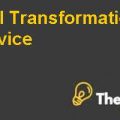Rio Tento Group had shown a significant sustainable development program under the supervision of Sir Robert Wilson in his tenure of about 30 years. The company rather than responding to the criticism by stakeholders, the company used the proactive approach and encouraged the Mining industry to promote sustainable development practices.
The company’s efforts supported by Wilson such as those that countered apartheid in South Africa, started numerous conservation programs in Western Australia, and in Utah efforts formed the Inland Sea Shorebird project, such all initiatives made the standards for the mining industry for sustainable development. To promote these practices with shared learning, Wilson played a key role in Global Mining initiatives and the Mining minerals and Sustainable Development projects.
Global Compact, a program to enhance sustainable development, was signed by Rio Tinto including 40 other transnational companies. However, with such significant initiative, the company confronted the criticism from numerous stakeholders.
Sir Robert Wilson was considering the insights which the successor would face because he was handing over the company to an oil industry Veteran Paul Skinner. He believed that societies demand for sustainability program, particularly for MNCs, would be increased.
Rio Tinto Group’s Sustainable Development Agenda Case Solution
He also felt the need to identify the shared values, other than the areas in which they operate. Many of the questions that had to be answered: How Skinner could continue Rio Tinto’s sustainable development agenda? Why some stakeholders were not satisfied with the sustainable development initiatives by the mining company? Although sustainability development seemed well, but could Rio Tinto make the business case for embracing this approach?













